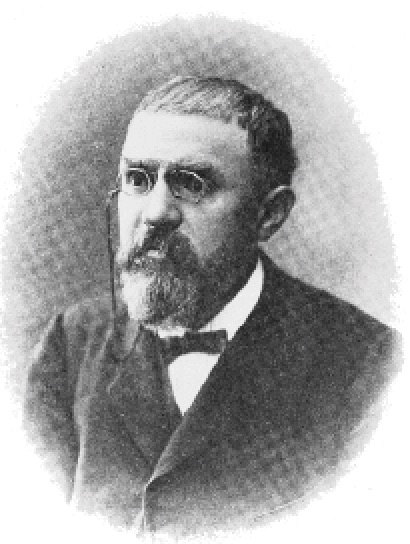
Henri Poincaré was born on April 29, 1854 in Nancy, Meurthe-et-Moselle, France. He has been described as the last universalist meaning that he was the last mathematician whose expertise spanned the entire discipline of mathematics. Among his celebrated achievements, was his discovery of what are called Fuchsian groups. In a speech delivered to the Société de Psychologie in 1908, Poincaré described his unconscious mental activity that exploded in a flash of illumination, revealing a solution to the problem that had haunted him for months:
Just at this time I left Caen, where I was living, to go on a geologic excursion under the auspices of the School of Mines. The incidents of travel made me forget my mathematical work. Having reached Coutances, we entered an omnibus to go some place or other. At the moment when I put my foot on the step the idea came to me, without anything in my former thoughts seeming to have paved the way for it, that the transformations I had used to define the Fuchsian functions were identical with those of non-Euclidean geometry. I did not verify the idea; I should not have had time, as, upon taking my seat in the omnibus, I went on with a conversation already commenced, but I felt a perfect certainty. On my return to Caen, for conscience’ sake I verified the result at my leisure.
Then I turned my attention to the study of some arithmetical questions apparently without much success and without a suspicion of any connection with my preceding researches. Disgusted with my failure, I went to spend a few days at the seaside, and thought of something else. One morning, walking on the bluff, the idea came to me, with just the same characteristics of brevity, suddenness and immediate certainty, that the arithmetic transformations of indeterminate ternary quadratic forms were identical with those of non-Euclidean geometry.
…Most striking at first is this appearance of sudden illumination, a manifest sign of long, unconscious prior work. The role of this unconscious work in mathematical invention appears to me incontestable.
In his seminal publication, The Psychology of Mathematical Invention. Jacques Hadamard, co-discoverer of a proof of the Prime Number Theorem, used the Poincaré narrative to describe a four-stage process that reaches climax in a eureka! moment.
Stage 1. Preparation: a period of intense conscious work that ends without a resolution of the problem.
Stage 2. Incubation: a period of relaxation when the conscious mind is at rest and the unconscious is exploring patterns and searching for connections and relationships in the underworld of the unknown knowns.
Stage 3. Illumination: a eureka! moment when an idea suddenly appears like a bolt out of the blue generating an immediate insight.
Stage 4. Consolidation: a conscious verification and precise articulation of the discovery that connects it to current knowledge–known knowns.
Poincaré’s model was a major contribution to cognitive psychology in describing how great ideas incubate in the sub-conscious and then hatch into brilliant illumination in the conscious mind.
